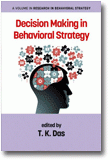
Decision Making in Behavioral Strategy
Edited by:
T. K. Das, City University of New York
A volume in the series: Research in Behavioral Strategy. Editor(s): T. K. Das, City University of New York.
Published 2016
Behavioral strategy continues to attract increasing research interest within the broader field of strategic management. Research in behavioral strategy has clear scope for development in tandem with such traditional streams of strategy research that involve economics, markets, resources, and technology. The key roles of psychology, organizational behavior, and behavioral decision making in the theory and practice of strategy have yet to be comprehensively grasped. Given that strategic thinking and strategic decision making are importantly concerned with human cognition, human decisions, and human behavior, it makes eminent sense to bring some balance in the strategy field by complementing the extant emphasis on the “objective’ economics-based view with substantive attention to the “subjective” individual-oriented perspective. This calls for more focused inquiries into the role and nature of the individual strategy actors, and their cognitions and behaviors, in the strategy research enterprise. For the purposes of this book series, behavioral strategy would be broadly construed as covering all aspects of the role of the strategy maker in the entire strategy field. The scholarship relating to behavioral strategy is widely believed to be dispersed in diverse literatures. These existing contributions that relate to behavioral strategy within the overall field of strategy has been known and perhaps valued by most scholars all along, but were not adequately appreciated or brought together as a coherent sub-field or as a distinct perspective of strategy. This book series on Research in Behavioral Strategy will cover the essential progress made thus far in this admittedly fragmented literature and elaborate upon fruitful streams of scholarship. More importantly, the book series will focus on providing a robust and comprehensive forum for the growing scholarship in behavioral strategy. In particular, the volumes in the series will cover new views of interdisciplinary theoretical frameworks and models (dealing with all behavioral aspects), significant practical problems of strategy formulation, implementation, and evaluation, and emerging areas of inquiry. The series will also include comprehensive empirical studies of selected segments of business, economic, industrial, government, and non-profit activities with potential for wider application of behavioral strategy. Through the ongoing release of focused topical titles, this book series will seek to disseminate theoretical insights and practical management information that will enable interested professionals to gain a rigorous and comprehensive understanding of the subject of behavioral strategy.
Decision Making in Behavioral Strategy contains contributions by leading scholars in the field of behavioral strategy research. The 10 chapters in this volume cover a number of significant issues relating to the decision making processes, practices, and perspectives in the field of behavioral strategy, covering diverse topics such as failures in acquisitions, entrepreneurs under ambiguity, metacognition, neural correlates of emotion, knowledge flows, behavioral responses, business modeling, and alliance capability. The chapters include empirical as well as conceptual treatments of the selected topics, and collectively present a wide-ranging review of the noteworthy research perspectives on decision making in behavioral strategy.
CONTENTS
About the Book Series. How Do Organizations Learn From the Failure of an Acquisition Attempt? Toward a Behavioral Learning Theory, Katsuhiko Shimizu. Entrepreneurs Under Ambiguity: A Prospect Theory Perspective, Corina Paraschiv and Anisa Shyti. Metacognition in Strategic Decision Making: An Integrative Review and a Research Agenda, Arash Najmaei and Zahra Sadeghinejad. The Neural Correlates of Emotion and Overconfidence in Strategic Decision Making, Theresa Treffers and Kai Fehse. Governance of Knowledge Flows in Open Exploration: The Role of Behavioral Control, Mehdi Bagherzadeh and Sabine Brunswicker. Behavioral Responses to Adverse Situations in Strategic Alliances, Brian Tjemkes and Olivier Furrer. Economics of Business Modeling: An Essay on the Economic Foundations of Managing Business Models, Arash Najmaei. Turning Experience into Alliance Capability: Alliance Evaluation in Rolls-Royce, Ard-Pieter de Man, Mike Nevin, and Nadine Roijakkers. Understanding the Role of Dynamic Managerial Capabilities in Creating Corporate Entrepreneurship and Improving Firm Performance: Evidence from the Indonesia Newspaper Industry, Budi W. Soetjipto and Muhammad Ridwan Arif. The Effect of Image Compatibility and Escalation of Commitment on Decision Performance: A Case of Individual Investors in Indonesia Stock Exchange, Budi W. Soetjipto and Harris T. Kurniawan. About the Contributors. Index.
-
Paperback9781681236575
Web price: $45.04 (Reg. 52.99)
-
Hardcover9781681236582
Web price: $80.74 (Reg. 94.99)
- eBook9781681236599

- BUS019000 - BUSINESS & ECONOMICS: Decision-Making & Problem Solving
- BUS063000 - BUSINESS & ECONOMICS: Strategic Planning
- BUS041000 - BUSINESS & ECONOMICS: Management








